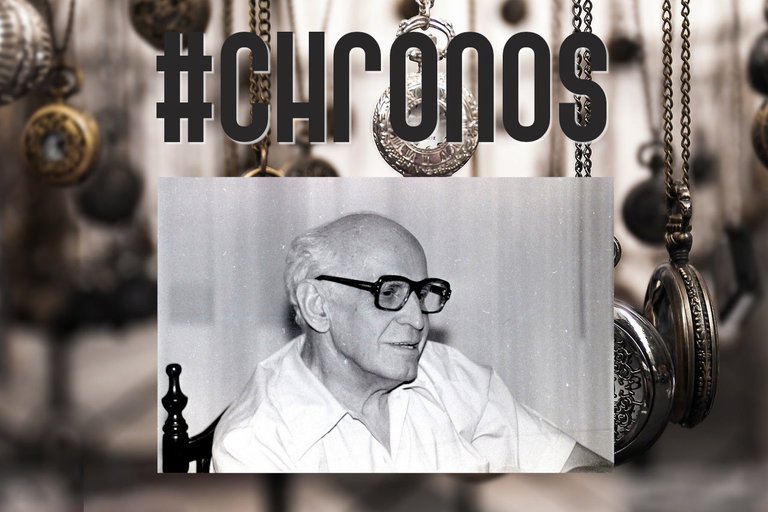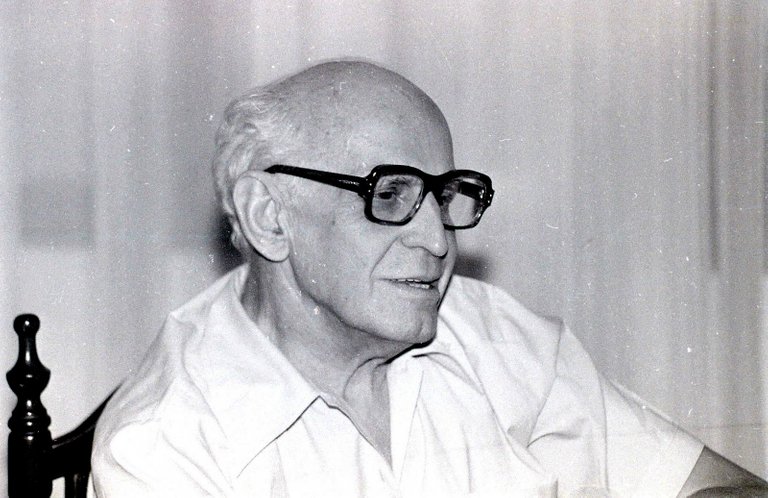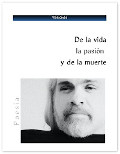Un ángel en el caos || An angel in the chaos #Chronos
Hoy vuelvo a retomar mis crónicas y traer en ellas a un personaje que se merece no solo una mención como esta sino todo un libro, por la cantidad y la calidad de enseñanzas que dejó en mí. Una persona completamente fuera de serie, junto a la cual viví muchas experiencias maravillosas. Una persona a quien considero mucho más que un maestro, un tutor, una inspiración.
Pero no me saldré de la temática de esta serie identificada con la etiqueta #Chronos, en la cual pretendo indagar en esa forma literaria tan latinoamericana, como lo es la crónica literaria.
Today I return to resume my chronicles and bring in them a character who deserves not only a mention like this but a whole book, for the quantity and quality of teachings he left in me. A person completely out of series, with whom I lived many wonderful experiences. A person whom I consider much more than a master, a tutor, an inspiration.
But I will not get out of the subject of this series identified with the label #Chronos, in which I intend to investigate in that literary form so Latin American, as is the literary chronicle.
English version below!

A finales de los años setenta tuve la oportunidad de trabajar como asistente personal de Eduardo Gallegos Mancera, quien era diputado del Congreso de la República por el Partido Comunista de Venezuela y uno de sus máximos dirigentes. Una experiencia única para mí, de apenas 18 años, pues se trataba de un médico, poeta, internacionalista y humanista con una cultura extrema y una sensibilidad social que sin duda me han marcado de por vida.
Una de las características de Eduardo era su accionar pragmático. Sus incontables vivencias lo hacían saber reaccionar muy rápidamente y su respuesta siempre era la acción oportuna.
En cierta oportunidad —si mal no recuerdo era 1978— la situación económica del país había llevado a un malestar general muy grande que concluyó con una marcha gigantesca solicitando un aumento general de salarios. Esta manifestación iba del este de la ciudad hasta el centro, con el fin de entregar un pliego petitorio en la sede del Congreso.
Al frente la marcha, en primera fila, iban dirigentes sindicales, gremiales y políticos. Entre ellos Eduardo. Como una parte de mi labor, así como la de otros muchachos que trabajaban con él, era cuidar de su integridad, los dos que estábamos ese día, nos quedamos cerca de él.
Cuando llegamos a la avenida México, ya bastante cerca de nuestro destino final, nos llama aparte y nos dice —¡Hay que estar alertas, porque esto es una trampa!
Yo miré a mi alrededor para ver de dónde sacaba esa idea, pero no pude ver nada. Eduardo se encargó de alertar a los demás dirigentes y finalmente cuando ya faltaban pocos metros para llegar a la sede del Congreso, vemos que hay una barricada de la policía con armamento de todo tipo.
—Hay que pedirle calma a la gente— nos advirtió —¡pues aquí están preparando una masacre!
En ese momento fue que explicó que todas las calles laterales estaban cerradas por grupos policiales y que si llegaba a haber algún tipo de reacción, todos estaríamos encerrados. El temor de Eduardo era que la gente tomara alguna acción contra la policía y esta respondiera, pero no hizo falta la provocación. Faltando cerca de 500 metros para llegar al destino, la policía abrió fuego de perdigones y gases lacrimógenos contra la manifestación. La gente empezó a correr buscando protección, pero tal como Eduardo lo había percibido, también de las calles laterales empezaron a disparar contra los manifestantes.
Yo lo primero que hice fue llevar a Eduardo a un lado de la calle para que no estuviéramos en el centro del ataque, pero de allí en adelante fue él quien empezó a guiarnos, buscando la manera de hallar una salida.
Los heridos de perdigones estaban por todos lados y los desmayados por los gases eran incontables. Eduardo, como buen médico al fin, empezó a atender a todos los que pudo. Pero en un momento de detuvo como a reflexionar y nos explicó el proceso en que se producía el desmayo por los gases. Luego de lo cual dijo, necesitamos atender a los desmayados para que los puedan sacar de acá y que una vez fuera, busquen la atención médica para los heridos por los disparos.
Trató de explicarnos cómo comprobar que el desmayo tenía que ver con los gases, según unos rasgos en la pupila y una manera de hacer presión en ambos ojos, con la esperanza de que pudiéramos ayudarlo con la cantidad de personas tendidas en el piso producto de la asfixia. Pero yo no lograba entender los pasos y me daba temor hacer algo indebido. Él lo entendió y solo pidió que lo ayudáramos a mover a las personas. De una manera increíble él les abría los ojos, los revisaba y con el dedo pulgar y el índice les hacía presión, con lo cual automáticamente reaccionaban con una inhalación profunda, como si se hubieran asustado. Así fue con uno, dos, tres…
El caos se había apoderado del centro de Caracas. Aproximadamente dos o tres horas tardamos en ir encontrando calles y pasadizos para escapar de aquel infierno, que poco a poco empezó a calmarse, gracias a los que lograban escapar de aquella emboscada, a los heridos que les permitían salir y a que ya la policía había empezado a suavizar el ataque ante la inminente disolución de la manifestación.
Fueron no menos de cincuenta personas que atendió Eduardo en ese recorrido y la acción era tan rápida: acercarse, acostarlo boca arriba, revisar las pupilas, hacer presión en los ojos y verlos reaccionar, para seguir adelante, que la gente alrededor no tenía tiempo de reaccionar y veían aquello como un milagro. Con cada paciente que reaccionaba, le daba un par de indicaciones a los acompañantes para salir de allí y cuidar del “paciente”.
Pero en cada una de esas personas uno veía la expresión al ver que “de la nada” apareció un señor mayor, de mirada bondadosa, vestido de traje blanco y que milagrosamente hizo volver en sí al desmayado (además de la manera tan teatral que menciono más arriba, con una inhalación profunda), y que inmediatamente desapareció. Lo cual trajo consigo la creencia de muchos de que se trató de un ángel, de un milagro mismo.


Eduardo Gallegos Mancera
English version
In the late seventies, I had the opportunity to work as a personal assistant to Eduardo Gallegos Mancera, who was a deputy of the Congress of the Republic for the Communist Party of Venezuela and one of its top leaders. It was a unique experience for me, barely 18 years old, because he was a doctor, poet, internationalist, and humanist with an extreme culture and social sensitivity that undoubtedly marked me for life.
One of Eduardo's characteristics was his pragmatic actions. His countless experiences made him know how to react very quickly and his response was always timely action.
On a certain occasion -if I remember correctly it was 1978- the economic situation of the country had led to a very great general unrest that concluded with a gigantic march requesting a general wage increase. This demonstration went from the east of the city to downtown, with the purpose of delivering a petition to Congress.
At the front of the march, in the first row, were union, trade union, and political leaders. Among them was Eduardo. As part of my job, as well as that of the other guys who worked with him, was to look after his safety, the two of us who were there that day stayed close to him.
When we arrived at Mexico Avenue, quite close to our final destination, he called us aside and said, "We have to be alert, because this is a trap!
I looked around to see where he got that idea, but I couldn't see anything. Eduardo was in charge of alerting the other leaders and finally, when we were only a few meters away from the Congress headquarters, we saw that there was a police barricade with all kinds of weapons.
-We must ask the people to calm down," he warned us, "because here they are preparing a massacre!
At that moment he explained that all the side streets were closed by police groups and that if there was any kind of reaction, we would all be locked in. Eduardo's fear was that the people would take action against the police and the police would respond, but no provocation was needed. With about 500 meters to go, the police opened fire with pellets and tear gas on the demonstration. People started to run for protection, but just as Eduardo had perceived, also from the side streets they started to shoot at the demonstrators.
The first thing I did was to take Eduardo to the side of the street so that we would not be in the center of the attack, but from then on it was he who began to guide us, looking for a way out.
The wounded by pellets were everywhere and those fainting from the gases were uncountable. Eduardo, like a good doctor, at last, began to attend to as many as he could. But at one point he stopped as if to reflect and explained to us the process in which fainting from the gases occurred. After which he said, we need to attend to the fainted so that they can get them out of here and once outside seek medical attention for those wounded by the gunshots.
He tried to explain to us how to prove that the fainting had to do with the gases, according to some features in the pupil and a way to put pressure on both eyes, hoping that we could help him with the number of people lying on the floor due to asphyxiation. But I could not understand the steps and was afraid to do anything wrong. He understood and just asked us to help him move the people. In an incredible way he opened their eyes, checked them and with his thumb and forefinger he put pressure on them, and they automatically reacted with a deep inhalation, as if they had been frightened. And so it was with one, two, three...
Chaos had taken over the center of Caracas. It took us approximately two or three hours to find streets and passages to escape from that hell, which little by little began to calm down, thanks to those who managed to escape from that ambush, to the wounded who were allowed to leave and to the fact that the police had already begun to soften the attack in view of the imminent dissolution of the demonstration.
No less than fifty people were attended by Eduardo in that tour and the action was so fast: to approach, lay them face up, check their pupils, put pressure on their eyes and see them react, to move on, that the people around them had no time to react and saw it as a miracle. With each patient who reacted, he gave a couple of indications to the people accompanying him to get out of there and take care of the "patient".
But in each of these people, one could see the expression that "out of nowhere" appeared an older gentleman, with a kindly look, dressed in a white suit and who miraculously brought the fainted person to his senses (in addition to the theatrical way I mentioned above, with a deep inhalation), and immediately disappeared. This led many to believe that it was an angel, a miracle itself.

Este texto pertenece a mi serie #Chronos. Puedes leer más sobre la misma en Mis crónicas literarias. Si es de tu agrado este estilo y quieres sumarte a la creación de crónicas literarias, te invito a usar la etiqueta #chronos para la misma.
This writing is part of my series #Chronos. You can read more about it on My literary chronicles. If you like this style and want to join the creation of literary chronicles, I invite you to use the hashtag #chronos for it.

Descarga el poemario de @Ylich"De la vida, la pasión y de la muerte"¡Haz clic aquí! |  |
|---|

If you don't have an account at Hive yet, I invite you to read my post My Hive Testimony || Mi testimonio Hive
Si aún no tienes cuenta en Hive te invito a leer mi publicación My Hive Testimony || Mi testimonio Hive

Esta publicación ha recibido el voto de Literatos, la comunidad de literatura en español en Hive y ha sido compartido en el blog de nuestra cuenta.
¿Quieres contribuir a engrandecer este proyecto? ¡Haz clic aquí y entérate cómo!
¡Muchas gracias!
!LUV
<><
@es-literatos, you've been given LUV from @ylich.
Check the LUV in your H-E wallet. (5/10)
@ylich en hora buena, la crónica es la mejor mención que se puede hacer a un personaje, de tantos que han influenciado nuestra vida y la de tantos. De esos hombres y mujeres que fueron más que otro ladrillo en la calzada.
Particularmente tengo el proyecto de ir hilvanando una serie de crónicas e historias locales a través de mi cuenta en esta prestigiosa comunidad de hive.
La historia es una de mis pasiones, pero la historia a decir de Lucien Febvre " que no existe Historia ni oficio sino Historias y oficios" así que estaré aceptando tu invitación gentil de usar tu etiqueta #chronos en esas futuras publicaciones.
¡Muy agradecido por este comentario tan nutrido!
¡Estaré esperando tus publicaciones!
https://twitter.com/YlichElRuso/status/1454952083233325060
The rewards earned on this comment will go directly to the person sharing the post on Twitter as long as they are registered with @poshtoken. Sign up at https://hiveposh.com.
Congratulations @ylich! You have completed the following achievement on the Hive blockchain and have been rewarded with new badge(s) :
Your next target is to reach 8000 replies.
You can view your badges on your board and compare yourself to others in the Ranking
If you no longer want to receive notifications, reply to this comment with the word
STOPCheck out the last post from @hivebuzz:
Excelente crónica. Médico, poeta, escritor y político. estas son las personas que hacen historia y dejan profundas huellas en quienes las conocen. !
¡Así es y somos muchos los que tenemos esta misma valoración de Eduardo! Y así como él, tantos otros...!
¡Gracias por comentar!
Enhorabuena. Has recibido apoyo
The Creative Coin Fund.
Únete al servidor de Creative Coin y comparte tus publicaciones.
Congratulations. You have received support from The Creative Coin Fund.
Join the Creative Coin server and share your posts.
Selección manual de @jesuspsoto
|
Image by barbara-orenya
¡Muchísimas gracias, amigos!